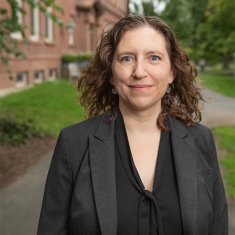The Master of Arts in Teaching (M.A.T.) is designed for students who are planning to teach in elementary, middle or high schools and for those wishing to do advanced study in the field of education.
Grounded in the liberal arts, Smith’s M.A.T. teacher preparation program combines the study of the learning sciences, human development, and educational and social theory with intensive experiences in the classroom. Our program will help you learn to differentiate your instruction to meet the diverse needs of today’s learners and help you find creative ways to motivate and guide students to become active participants in their own learning.
Summer education courses for teachers run from July 1 through August 1, 2023. Find course information below in Requirements & Courses.
In the course of an intensive five week summer session and a full time academic year, or with a part-time two-year option, students will be able to complete the state approved program for licensure in one of the following fields:
Grades PK–8
- Visual Arts
Grades 1–6
- Elementary
Grades 5–8
- Middle School Humanities
- Middle School Math/Science
- General Science
Grades 5–12
- English
- French
- History
- Mandarin
- Social Science
- Spanish
Grades 8–12
- Biology
- Math
- Physics
- Chemistry
- Earth and Space Science
The Program
Students who follow the master of arts in teaching program will be able to complete the state-approved program in teacher education enabling them to meet the requirements for licensure in various states.
Local Fieldwork Placements
The Department of Education and Child Study uses a variety of schools and settings to provide opportunities for observation, service learning and classroom teaching experiences. These include the Campus School of Smith College, public schools in Northampton and other area communities, as well as several private schools.
A Supportive Community
This small, flexible program allows you to deeply engage with faculty, your peers and practicing teachers around the core disciplines of teaching and learning. From the outset, you will work in a classroom under the mentorship of experienced teachers. As part of a team, you can engage in honest communication and an open exchange of ideas to develop true partnerships with professors, mentor teachers from local schools, and other experienced educators. Beyond graduation, you will be part of Smith’s active alumni network for lasting support and professional connections.
More Information
If you have questions about the M.A.T. program, please contact Lynn R. Dole, coordinator of teacher education.
If you have questions about the admission and application process, please contact Ruth Morgan, director of graduate & special programs.
Admission prerequisites and course requirements vary depending upon the specific program.
Prospective candidates should have a superior undergraduate record and should present evidence of personal qualifications for effective teaching. Those interested in the M.A.T. in secondary or middle school teaching should also possess an appropriate concentration—normally a major—in the subject of the teaching field. All applicants should submit a paper or other piece of work that is illustrative of their writing. Applicants with teaching experience should include a letter of recommendation concerning their teaching.
To qualify for a degree, the candidate must obtain a grade of B- or better in all courses or seminars, although a grade of C in one four-credit course may be permitted on departmental recommendation. Courses for graduate credit may not be taken on a satisfactory/unsatisfactory basis.
Apply to the M.A.T. Program
If you have questions about the application process, please contact Ruth Morgan, director of graduate & special programs.
- Understand the role of cultural and human diversity in the design and practice of education.
- Understand current theories of learning and how they shape principles of pedagogical practice across ages and subject matter.
- Understand current theories of human development—infancy through adolescence.
- Understand the major factors that influence the design of learning environments.
- Develop applied and practical knowledge and skill to support the growth and success of beginning teachers. (These learning goals are elaborated in the description of our state approved teacher preparation programs.)
Elementary Level (Grades 1–6)
A minimum of 32 semester hours and final course grades of B- or better are required for completion of the M.A.T. degree. Graduate students pursuing Massachusetts Educator Licensure at the elementary level are required to participate in the summer semester.
Professional Teaching Knowledge (Pedagogy) Requirements
-
EDC 556 Learning in Classrooms (summer)
-
EDC 511 Sheltering Instruction for English Language Learners (summer)
-
EDC 338 Children Learning to Read (fall)
-
EDC 548 Student Diversity and Classroom Teaching (fall)
-
EDC 554 Design of the Learning Environment (fall)
-
EDC 345s Elementary Teaching Methods (year-long course)
-
EDC 552 Perspectives on American Education (spring)
-
EDC 559 Clinical Internship in Teaching and Reflective Seminar (spring)
Subject Matter Knowledge
All students seeking Massachusetts Educator Licensure must have an undergraduate major in the liberal arts and sciences. Prior to entering the M.A.T. program, the student and adviser will review the student’s undergraduate transcript for subject matter preparation in the following areas:
Literature
- Must include American, British and world literature
History
- Must include U.S. history, colonial to present, and/or American government, including the founding documents
- World history and European history, ancient to present
Natural Science
- Must include one lab science
Mathematics
- Must include 9 credits of college-level math courses
Social Sciences
- Must include the studies of economics and geography
Electives
-
EDC 342 Growing Up American: Adolescents and Their Educational Institutions
-
EDC 343 Multicultural Education
-
HST 390 Teaching History
-
ENG 399 Teaching Literature
-
Others options available, with consultation of advisor
Secondary-Level (Grades 5–12)
A minimum of 32 semester hours and final course grades of B- or better are required for completion of the M.A.T. degree. Graduate students pursuing Massachusetts Educator Licensure at the secondary level are required to participate in the summer semester.
Professional Teaching Knowledge (Pedagogy) Requirements
-
EDC 556 Learning in Classrooms (summer)
-
EDC 511 Sheltering Instruction for English Language Learners (summer)
-
EDC 548 Student Diversity and Classroom Teaching (fall)
-
EDC 554 Design of the Learning Environment (fall)
-
EDC 352 Methods of Instruction (fall)
-
EDC 559 Clinical Internship in Teaching and Reflective Seminar (spring)
-
EDC 552 Perspectives in American Education (spring)
-
Subject specific methods (semester dependent on subject area)
Subject Matter Knowledge
Students must have an undergraduate major in the liberal arts or sciences.
All candidates must meet subject matter knowledge requirements identified by the Commonwealth of Massachusetts. Students work with advisers from the department to choose subject matter courses that complete the requirements for subject matter knowledge in the subject/area they seek licensure.
Teaching Practicum
Students complete their teaching practicum in one semester, teaching daily, from approximately 7:30 a.m. to 2 p.m.
Workload
Students are encouraged to take only three courses during their student teaching semester.
Smith College is pleased to offer graduate courses during the summer, available to M.A.T. students, area teachers and those studying education at other institutions. In our five-week summer session, teachers can earn four or eight credits (90–180 PDPs). Teachers successfully completing EDC 511 will earn their Sheltered English Immersion Endorsement in Massachusetts.
For More Information
Questions about the summer offerings should be directed to Lynn R. Dole, coordinator of teacher education, 413-585-4650.
Courses Offered
New Program: Additional Licensure in Special Education/Moderate Disabilities (PK-8 or 5-12)
The following two special education courses provide the necessary competencies for additional licensure in moderate disabilities. Individuals who hold initial or professional teaching licenses and complete both EDC 550 and EDC 551, take the appropriate MTELs, and complete a 150 practicum or internship with a licensed teacher in moderate disabilities are eligible to apply to the Massachusetts Department of Elementary and Secondary Education for an additional license in moderate disabilities, grades PK-8 or 5-12.
EDC 550 The Policies and Procedures of Inclusion
This course will focus on the laws and policies governing special education, including eligibility categories and determinations, testing and creating useful assessment reports, progress monitoring, writing and implementing IEP and 504 plans, working collaboratively with agencies and other service providers, and assistive technology. Credits: 4
EDC 551 The Inclusive Classroom: Designing Effective Instruction
This course will focus on the models of instructional practice for students with mild to moderate disabilities, including models of co-teaching and inclusion, differentiated instruction, universal design, positive behavioral supports and effective classroom management practices. Students will learn strategies for supporting students in reading, writing, and mathematics, as well as with executive function and study skills. This course requires fieldwork in an inclusive classroom. Credits: 4
SEI Endorsement Course
EDC 511: Rethinking Equity and Teaching for English Language Learners
This course prepares teachers to shelter their English language instruction by increasing their knowledge of student variation and cultural considerations, second language acquisition theory, English language arts/literacy, English language development standards and assessments, and effective practices in English language learner (ELL) instruction. Participants learn to tailor their instruction for ELLs by including rigorous academic language and vocabulary development, readings of complex grade-level informational and literary texts, and discussion and writing in response to texts, and also by developing content standards for various academic disciplines. This course requires fieldwork with English language learners. Successful completion of this course leads to the Sheltered English Immersion (SEI) endorsement. Credits: 4
EDC 556: Learning in Classrooms
What makes a good teacher? What makes a good student? This course combines perspectives on child and adolescent development with cognitive science to examine how principles of educational psychology can be applied to the classroom. Students will critically read educational research and apply major course concepts to case studies. This course requires fieldwork. Credits: 4
Summer Program Tuition Fee
For one or two courses: $2,500, 4 credits per course
Requirements for Admission
- Official copies of an undergraduate transcript, showing degree and date awarded
- Nondegree student application
- Nondegree student health form
How To Apply
Application materials can be submitted to: Ruth Morgan, Office of Graduate and Special Program, 413-585-3053
All required materials must be received by June 1, 2023.
Please be aware that the tuition fee must be paid in full before registration can be completed.
Project Coach Graduate Fellowships
About the Project Coach Fellowship
The Project Coach (PC) Graduate Fellowship in Teaching or Exercise & Sport Science is designed to prepare aspiring educators and coaches through firsthand experience in mentorship and sports-based youth development.
We believe that to be a good educator or coach one must understand the socioecosystem of a child’s life—the 20 percent of the time they spend in school as well as their crucial out-of-school experiences. Project Coach Fellows work in Smith College’s nationally recognized youth development program that provides free after-school recreation and academic support to children and teens in Springfield, Massachusetts. The fellowship is a singular opportunity for aspiring teachers to explore the critical factors that shape a child’s life.
PC Fellows work as mentors, coaches and team leaders in Project Coach’s afterschool program. Fellows receive academic-year tuition waivers equal to the cost of their grad programs. Fellows must pay for summer course tuition if their graduate program requires it.

MAT Fellows complete their MAT degree in one or two years and graduate with Massachusetts licensure. ESS Fellows complete their ESS degree in two years. Smith College graduate programs are open to all genders.
Fellowship Requirements
PC Fellows work toward their MAT degree or MS in exercise and sport studies by attending Smith College classes and working 6–8 hours per week as an assistant in Project Coach, which will link them with youth in Springfield, Massachusetts. Learn more about Smith’s Master of Arts in Teaching Program and Master of Science in Exercise & Sport Studies.
Basic Schedule (Subject to Change)
- Project Coach Leadership Academy at Smith College on Monday evenings
- Weekly fellowship meetings
- After-school programming in Springfield, MA (1–2 days per week)
- A few weekend programming days will be required throughout the year
Application Instructions
In order to be considered for the Project Coach Fellowship, applicants must be accepted by the Smith College graduate program of their choice, either the Master of Arts in Teaching (MAT) or the Master of Exercise & Sport Science (ESS). Please visit the Smith College graduate program website for details on those programs and application instructions. Both the MAT and ESS programs have their own deadlines.
To apply for the PC Fellowship, you must complete the PC Fellowship Supplemental Application for submission to the graduate program office in addition to your graduate program application.
Deadlines & Expected Timeline for PC Fellowship Decisions
- Application Opens: November 1
- Priority deadline for applications: January 31
- Interviews: February–March
- Decisions expected by March 31
- While our priority deadline for applications is January 31, we will continue to accept applications on a rolling basis until we make our final decisions and fill our cohort.

Contact Information
For questions about graduate program admissions, contact Ruth Morgan at rmorgan@smith.edu.
For questions about the Master of Arts in Teaching (i.e. coursework and schedule, requirements, student teaching), contact Lynn Dole at ldole@smith.edu.
For questions and contact info for the Master of Science in Exercise & Sport Studies program, visit the ESS webpage.
For questions specifically related to Project Coach, please contact Brittany Gaetano at bgaetano@smith.edu.
Teacher Testimonials
“Through multiple in-person teaching experiences, mentoring and feedback loops, Smith’s M.A.T. program sets you up to successfully enter any classroom.”
– Dana Auger, Third Grade Teacher, Springfield, Massachusetts
“Not only did I have a great experience with every educator working within the program, but I felt highly prepared when I started my first year of teaching.”
– Lindsey Lord, Chemistry Teacher, Hadley, Massachusetts
Contact
For more information about the M.A.T. program, contact Lynn Dole, coordinator of teacher education. For admission information, contact Ruth Morgan, director of graduate & special programs.













